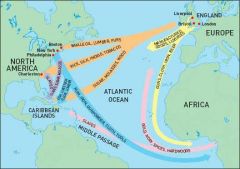![]()
![]()
![]()
Use LEFT and RIGHT arrow keys to navigate between flashcards;
Use UP and DOWN arrow keys to flip the card;
H to show hint;
A reads text to speech;
16 Cards in this Set
- Front
- Back
|
Maize |
Corn |
|
|
Effects of Maize |
•Native Americans moved away from hunting and gathering roaming societies into permanent settlements and created irrigation techniques to grow Maize and other crops |
|
|
Why it's important |
•Finding food was no longer a struggle •Had time to develop sophisticated agricultural techniques and infrastruture |
|
|
Diversity of Native People |
•Pueblo people settled into large communities,large # of Native tribes continued to be mobile and reliant on hunting and gathering •South America was home to ~Mayans(Central America) ~Incas(Peru) ~Aztecs(Central Mexico) ~Cherokee (Southeast) ~Cheyenne (Great plains) ~Iroquois (Atlantic Seaboard) ~Navajo (Southwest) |
|
|
Iroquois Confederacy |
Led by Hiawatha •a Confederacy of the give tribes in the northeast that branded together in order to better survive Why it's important Led to the development of Native American villages and settlements on the Atlantic Seaboard that is still defined the typical north American trend |
|
|
Geography |
•Tribes in the great Plains had to move around to follow/hunt buffalo •Tribes in the east had fertile soil to grow crops and sustain themselves(allowing them to have permanent settlements) |
|
|
Algonquin Village Life |
•one of the osteoporosis important tribes in NA •relied on division of labor and agriculture •Community spread to encompass the black feet and Ottawa tribe •if asked on test assume test is referring to the Algonquin people of the Atlantic northeast Why it's important Focus on the general treads(native American life on the Atlantic Seaboard ) |
|
|
Impact of European Contact |
•Before CC the native people had a way of life though not as technologically advance it was still complex and diverse in its own way •European Contact nearly wiped out the native American population (Both from physical violence and disease and vice versa) -smallpox -measles -malaria -yellow fever -influenza -chicken pox Native Americans(Old world) -syphilis -polio -hepatitis •Reasons why the diseases had a huge impact -the type of diseases could be passed through air or touch-natives had weak immune systems -natives had weak immune systems |
|
|
Atlantic Slave Trade |

|
|
|
Hernando De Soto |
•First European Explorer(near florida) •member of the Spanish government •landed on modern day Tampa bay,Florida in 1539 and proceeded through Georgia and south Carolina across the Appalachians (NC) and west through Tennessee •died of a fever in may of 1542 •His group returned home and the mission was considered a failure |
|
|
Three G's |
GOD GOLD GLORY |
|
|
Consequences of European Contact |
•Las Casas vs. Sepulveda demonstrated the drastically differing views that the colonizers had to the indigenous population •Aroma Indians The significance of the massacre is still felt today amount the native Americans in the region. This was an important moment in native American and colonial relations that is indicative of the countries mistreatment that would follow |
|
|
Patterns of Colonization |
The southern colonies(consisted of Virginia,Maryland,North Carolina, South Carolina, and Georgia)
•Jamestown and later colonies in the South were founded by Royal Charter companies to compete with the European powers and being forced the British economy via agriculture
•When they realized there wasn't enough labor to work on the crops they started looking for other sources:Africa
•beginning of the Atlantic slave trade
|
|
|
New england |
•colonies consisted of New Hampshire, Rhode Island, and Connecticut •established by puritan's seeking religious freedom from Britain church •close-knit, homogeneous societies •mix of Commerce and agriculture |
|
|
Impact of Exchange |
Tensions between the natives, African americans, and the Europeans created a host of problems for everyone. The Europeans didn't want to accept the natives ways and vice versa. African Americans were beginning enslaved and if not enslave they would be fighting for freedom |
|
|
Native Relations |
•European powers saw the potential in native tribes for colonization and worked to forge alliances w/tribes. Mid-1600s many bloody conflicts occurred b/w the native and French(also know as the Beaver wars) •Diseases and religion crippled the native population |

